Leadership for Managers
VerifiedAdded on 2023/06/07
|9
|2363
|382
AI Summary
This article discusses the concept of leadership for managers in business and the factors that regulate effective leadership. It also explores the personality traits of an efficient leader and the importance of building effective relationships with team members. The article concludes with a reflection on the author's own strengths and weaknesses as a leader and the steps they plan to take to enhance their leadership skills.
Contribute Materials
Your contribution can guide someone’s learning journey. Share your
documents today.
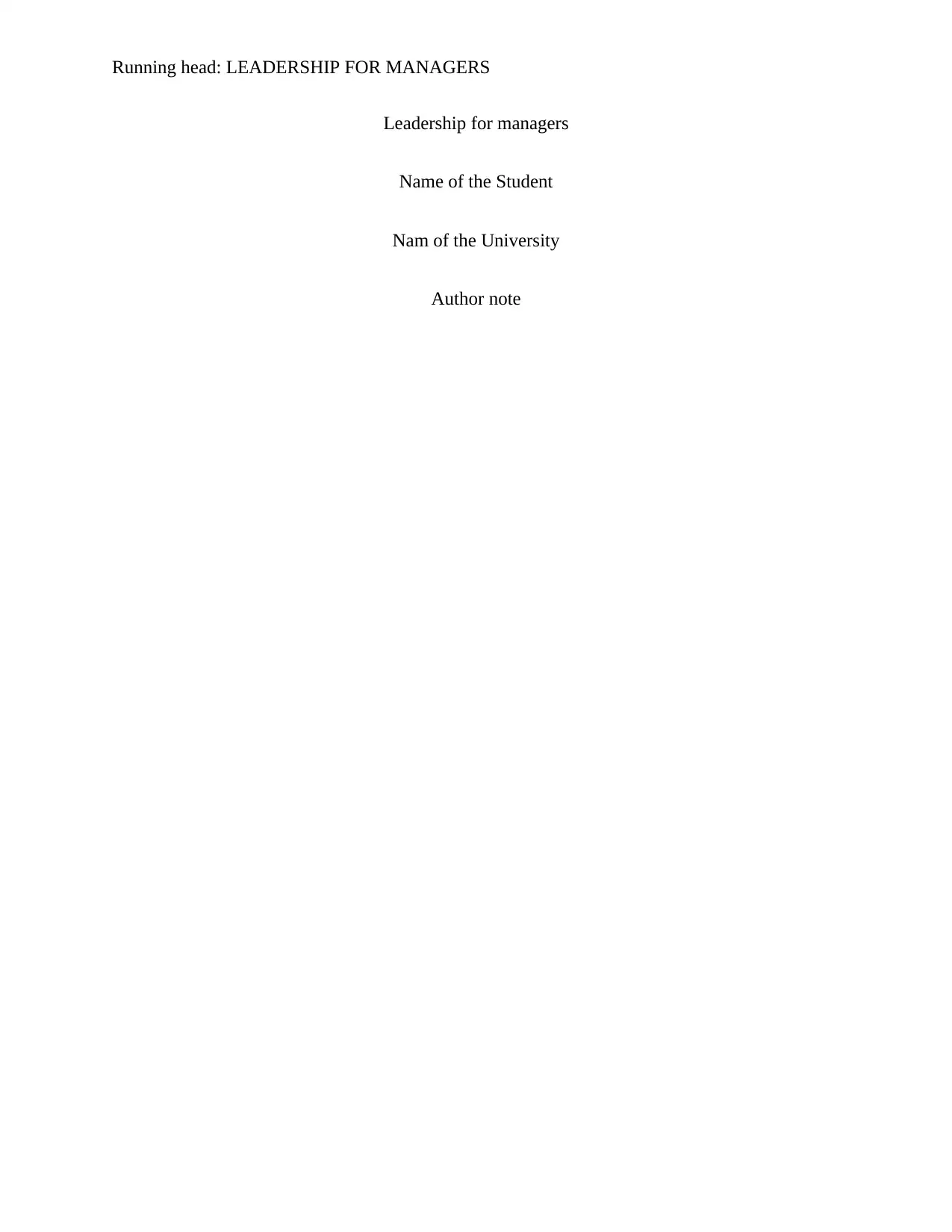
Running head: LEADERSHIP FOR MANAGERS
Leadership for managers
Name of the Student
Nam of the University
Author note
Leadership for managers
Name of the Student
Nam of the University
Author note
Secure Best Marks with AI Grader
Need help grading? Try our AI Grader for instant feedback on your assignments.
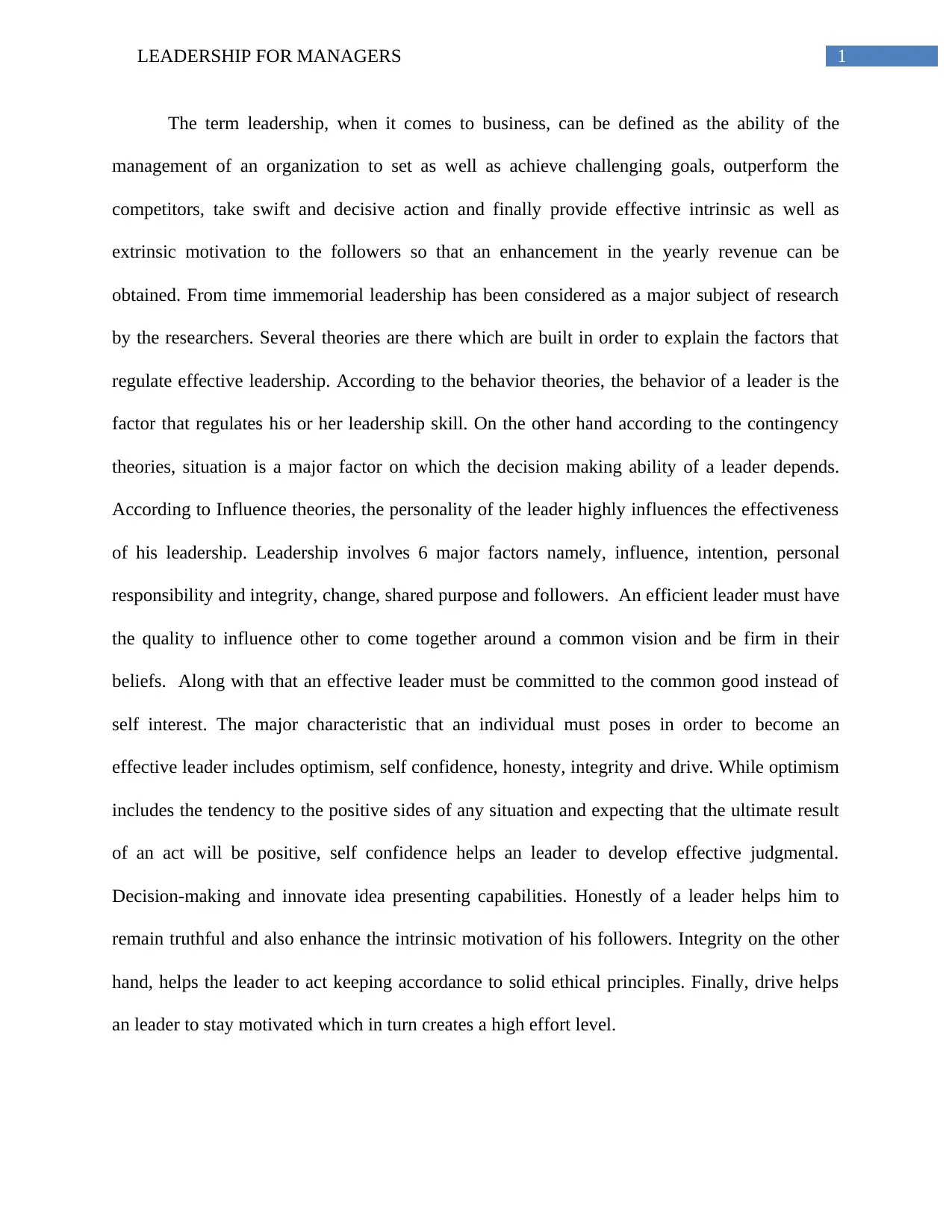
1LEADERSHIP FOR MANAGERS
The term leadership, when it comes to business, can be defined as the ability of the
management of an organization to set as well as achieve challenging goals, outperform the
competitors, take swift and decisive action and finally provide effective intrinsic as well as
extrinsic motivation to the followers so that an enhancement in the yearly revenue can be
obtained. From time immemorial leadership has been considered as a major subject of research
by the researchers. Several theories are there which are built in order to explain the factors that
regulate effective leadership. According to the behavior theories, the behavior of a leader is the
factor that regulates his or her leadership skill. On the other hand according to the contingency
theories, situation is a major factor on which the decision making ability of a leader depends.
According to Influence theories, the personality of the leader highly influences the effectiveness
of his leadership. Leadership involves 6 major factors namely, influence, intention, personal
responsibility and integrity, change, shared purpose and followers. An efficient leader must have
the quality to influence other to come together around a common vision and be firm in their
beliefs. Along with that an effective leader must be committed to the common good instead of
self interest. The major characteristic that an individual must poses in order to become an
effective leader includes optimism, self confidence, honesty, integrity and drive. While optimism
includes the tendency to the positive sides of any situation and expecting that the ultimate result
of an act will be positive, self confidence helps an leader to develop effective judgmental.
Decision-making and innovate idea presenting capabilities. Honestly of a leader helps him to
remain truthful and also enhance the intrinsic motivation of his followers. Integrity on the other
hand, helps the leader to act keeping accordance to solid ethical principles. Finally, drive helps
an leader to stay motivated which in turn creates a high effort level.
The term leadership, when it comes to business, can be defined as the ability of the
management of an organization to set as well as achieve challenging goals, outperform the
competitors, take swift and decisive action and finally provide effective intrinsic as well as
extrinsic motivation to the followers so that an enhancement in the yearly revenue can be
obtained. From time immemorial leadership has been considered as a major subject of research
by the researchers. Several theories are there which are built in order to explain the factors that
regulate effective leadership. According to the behavior theories, the behavior of a leader is the
factor that regulates his or her leadership skill. On the other hand according to the contingency
theories, situation is a major factor on which the decision making ability of a leader depends.
According to Influence theories, the personality of the leader highly influences the effectiveness
of his leadership. Leadership involves 6 major factors namely, influence, intention, personal
responsibility and integrity, change, shared purpose and followers. An efficient leader must have
the quality to influence other to come together around a common vision and be firm in their
beliefs. Along with that an effective leader must be committed to the common good instead of
self interest. The major characteristic that an individual must poses in order to become an
effective leader includes optimism, self confidence, honesty, integrity and drive. While optimism
includes the tendency to the positive sides of any situation and expecting that the ultimate result
of an act will be positive, self confidence helps an leader to develop effective judgmental.
Decision-making and innovate idea presenting capabilities. Honestly of a leader helps him to
remain truthful and also enhance the intrinsic motivation of his followers. Integrity on the other
hand, helps the leader to act keeping accordance to solid ethical principles. Finally, drive helps
an leader to stay motivated which in turn creates a high effort level.
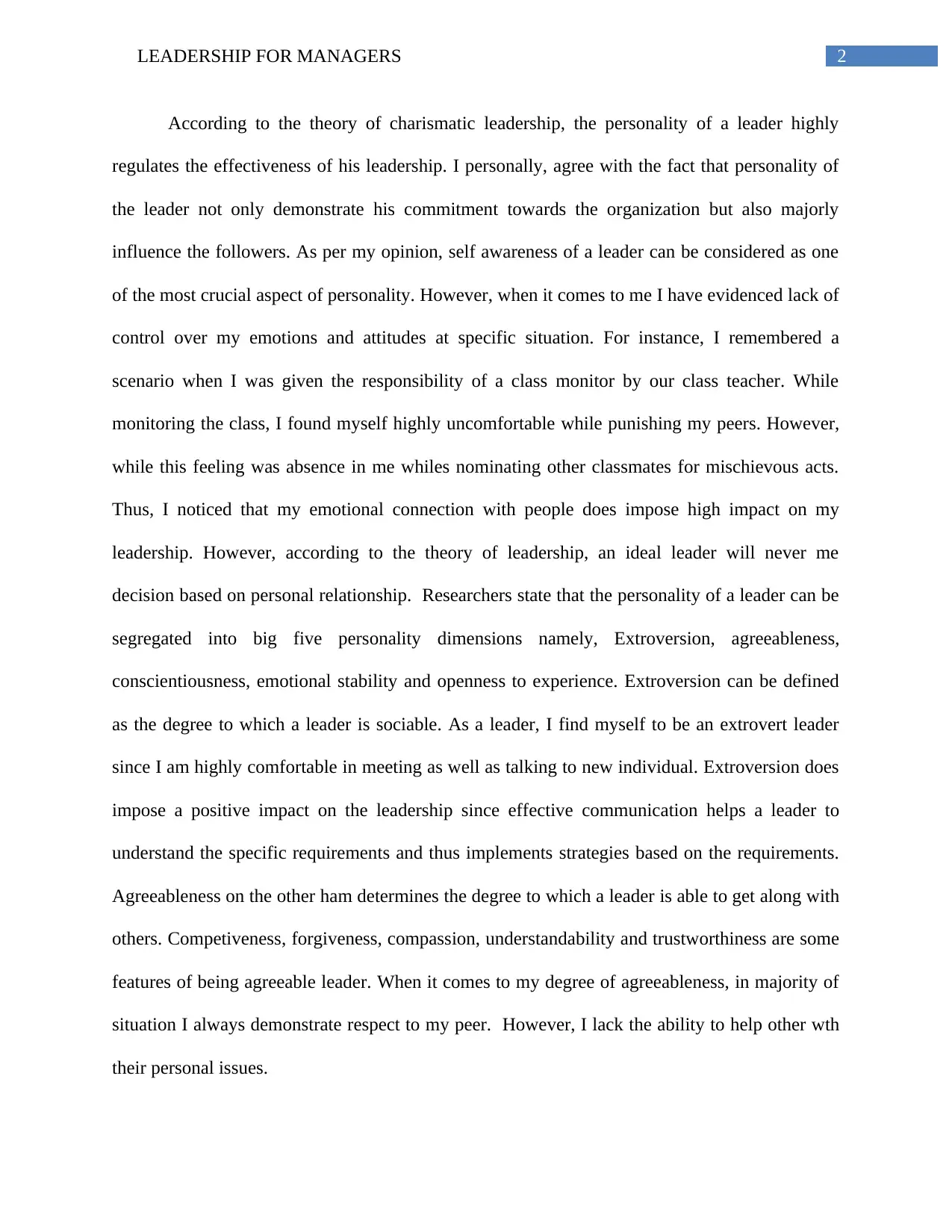
2LEADERSHIP FOR MANAGERS
According to the theory of charismatic leadership, the personality of a leader highly
regulates the effectiveness of his leadership. I personally, agree with the fact that personality of
the leader not only demonstrate his commitment towards the organization but also majorly
influence the followers. As per my opinion, self awareness of a leader can be considered as one
of the most crucial aspect of personality. However, when it comes to me I have evidenced lack of
control over my emotions and attitudes at specific situation. For instance, I remembered a
scenario when I was given the responsibility of a class monitor by our class teacher. While
monitoring the class, I found myself highly uncomfortable while punishing my peers. However,
while this feeling was absence in me whiles nominating other classmates for mischievous acts.
Thus, I noticed that my emotional connection with people does impose high impact on my
leadership. However, according to the theory of leadership, an ideal leader will never me
decision based on personal relationship. Researchers state that the personality of a leader can be
segregated into big five personality dimensions namely, Extroversion, agreeableness,
conscientiousness, emotional stability and openness to experience. Extroversion can be defined
as the degree to which a leader is sociable. As a leader, I find myself to be an extrovert leader
since I am highly comfortable in meeting as well as talking to new individual. Extroversion does
impose a positive impact on the leadership since effective communication helps a leader to
understand the specific requirements and thus implements strategies based on the requirements.
Agreeableness on the other ham determines the degree to which a leader is able to get along with
others. Competiveness, forgiveness, compassion, understandability and trustworthiness are some
features of being agreeable leader. When it comes to my degree of agreeableness, in majority of
situation I always demonstrate respect to my peer. However, I lack the ability to help other wth
their personal issues.
According to the theory of charismatic leadership, the personality of a leader highly
regulates the effectiveness of his leadership. I personally, agree with the fact that personality of
the leader not only demonstrate his commitment towards the organization but also majorly
influence the followers. As per my opinion, self awareness of a leader can be considered as one
of the most crucial aspect of personality. However, when it comes to me I have evidenced lack of
control over my emotions and attitudes at specific situation. For instance, I remembered a
scenario when I was given the responsibility of a class monitor by our class teacher. While
monitoring the class, I found myself highly uncomfortable while punishing my peers. However,
while this feeling was absence in me whiles nominating other classmates for mischievous acts.
Thus, I noticed that my emotional connection with people does impose high impact on my
leadership. However, according to the theory of leadership, an ideal leader will never me
decision based on personal relationship. Researchers state that the personality of a leader can be
segregated into big five personality dimensions namely, Extroversion, agreeableness,
conscientiousness, emotional stability and openness to experience. Extroversion can be defined
as the degree to which a leader is sociable. As a leader, I find myself to be an extrovert leader
since I am highly comfortable in meeting as well as talking to new individual. Extroversion does
impose a positive impact on the leadership since effective communication helps a leader to
understand the specific requirements and thus implements strategies based on the requirements.
Agreeableness on the other ham determines the degree to which a leader is able to get along with
others. Competiveness, forgiveness, compassion, understandability and trustworthiness are some
features of being agreeable leader. When it comes to my degree of agreeableness, in majority of
situation I always demonstrate respect to my peer. However, I lack the ability to help other wth
their personal issues.
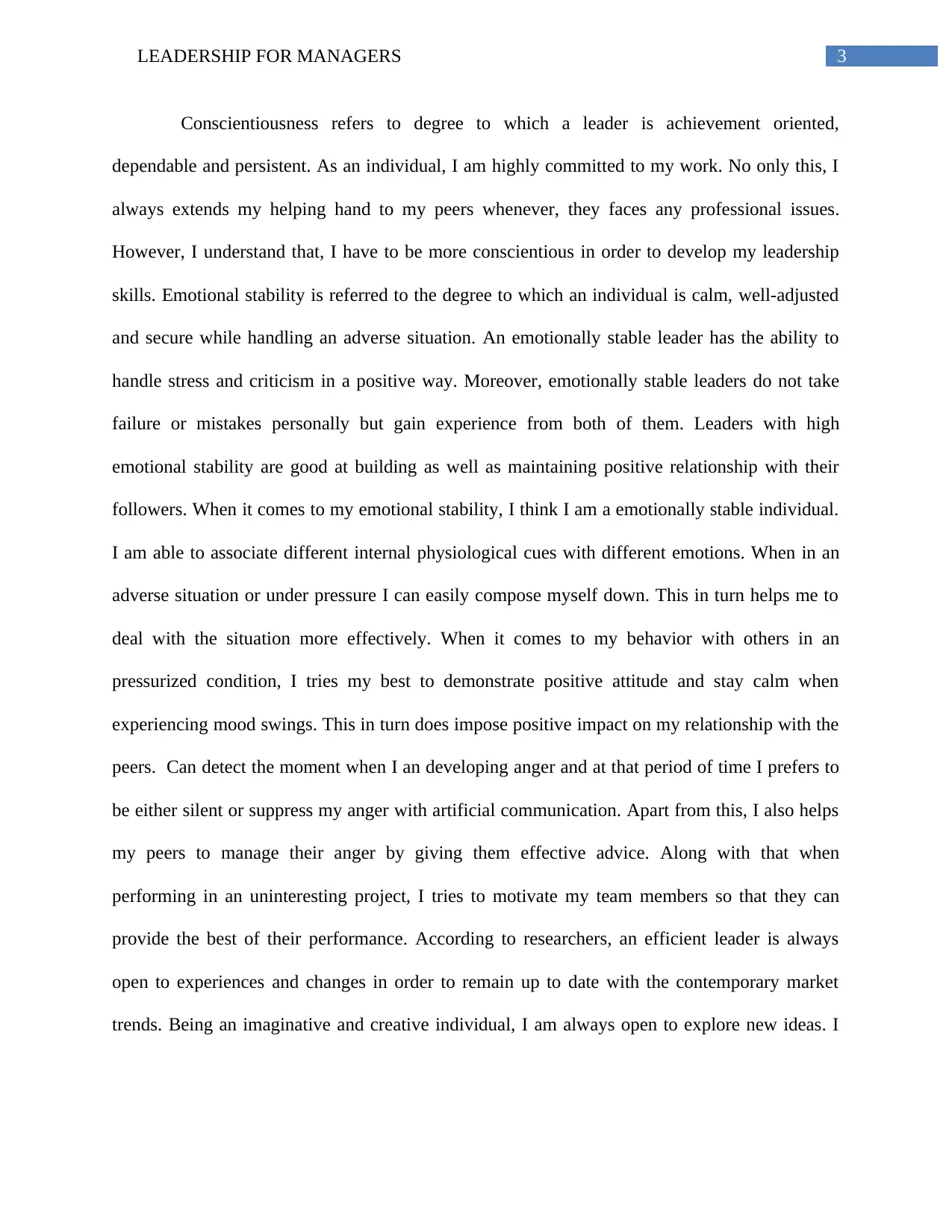
3LEADERSHIP FOR MANAGERS
Conscientiousness refers to degree to which a leader is achievement oriented,
dependable and persistent. As an individual, I am highly committed to my work. No only this, I
always extends my helping hand to my peers whenever, they faces any professional issues.
However, I understand that, I have to be more conscientious in order to develop my leadership
skills. Emotional stability is referred to the degree to which an individual is calm, well-adjusted
and secure while handling an adverse situation. An emotionally stable leader has the ability to
handle stress and criticism in a positive way. Moreover, emotionally stable leaders do not take
failure or mistakes personally but gain experience from both of them. Leaders with high
emotional stability are good at building as well as maintaining positive relationship with their
followers. When it comes to my emotional stability, I think I am a emotionally stable individual.
I am able to associate different internal physiological cues with different emotions. When in an
adverse situation or under pressure I can easily compose myself down. This in turn helps me to
deal with the situation more effectively. When it comes to my behavior with others in an
pressurized condition, I tries my best to demonstrate positive attitude and stay calm when
experiencing mood swings. This in turn does impose positive impact on my relationship with the
peers. Can detect the moment when I an developing anger and at that period of time I prefers to
be either silent or suppress my anger with artificial communication. Apart from this, I also helps
my peers to manage their anger by giving them effective advice. Along with that when
performing in an uninteresting project, I tries to motivate my team members so that they can
provide the best of their performance. According to researchers, an efficient leader is always
open to experiences and changes in order to remain up to date with the contemporary market
trends. Being an imaginative and creative individual, I am always open to explore new ideas. I
Conscientiousness refers to degree to which a leader is achievement oriented,
dependable and persistent. As an individual, I am highly committed to my work. No only this, I
always extends my helping hand to my peers whenever, they faces any professional issues.
However, I understand that, I have to be more conscientious in order to develop my leadership
skills. Emotional stability is referred to the degree to which an individual is calm, well-adjusted
and secure while handling an adverse situation. An emotionally stable leader has the ability to
handle stress and criticism in a positive way. Moreover, emotionally stable leaders do not take
failure or mistakes personally but gain experience from both of them. Leaders with high
emotional stability are good at building as well as maintaining positive relationship with their
followers. When it comes to my emotional stability, I think I am a emotionally stable individual.
I am able to associate different internal physiological cues with different emotions. When in an
adverse situation or under pressure I can easily compose myself down. This in turn helps me to
deal with the situation more effectively. When it comes to my behavior with others in an
pressurized condition, I tries my best to demonstrate positive attitude and stay calm when
experiencing mood swings. This in turn does impose positive impact on my relationship with the
peers. Can detect the moment when I an developing anger and at that period of time I prefers to
be either silent or suppress my anger with artificial communication. Apart from this, I also helps
my peers to manage their anger by giving them effective advice. Along with that when
performing in an uninteresting project, I tries to motivate my team members so that they can
provide the best of their performance. According to researchers, an efficient leader is always
open to experiences and changes in order to remain up to date with the contemporary market
trends. Being an imaginative and creative individual, I am always open to explore new ideas. I
Secure Best Marks with AI Grader
Need help grading? Try our AI Grader for instant feedback on your assignments.
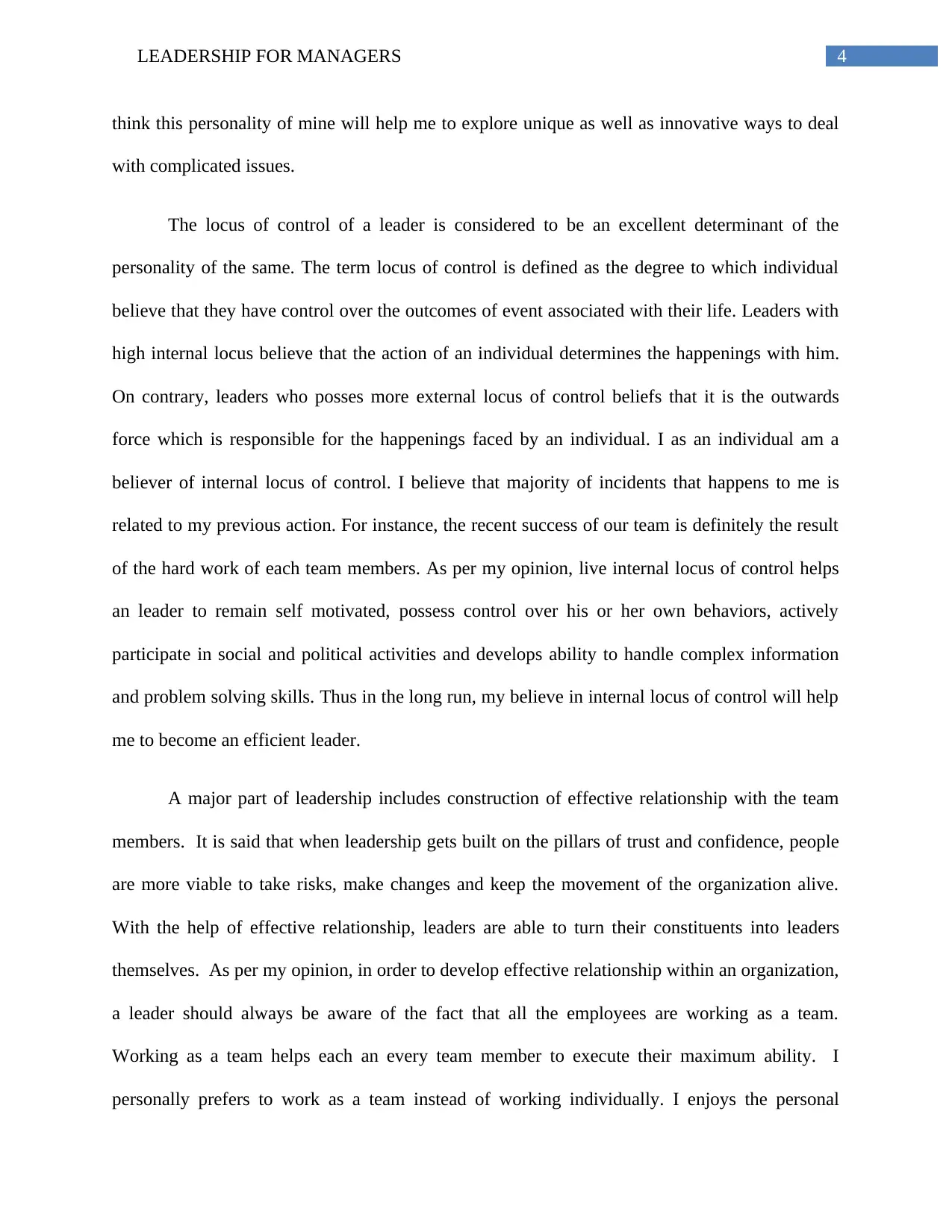
4LEADERSHIP FOR MANAGERS
think this personality of mine will help me to explore unique as well as innovative ways to deal
with complicated issues.
The locus of control of a leader is considered to be an excellent determinant of the
personality of the same. The term locus of control is defined as the degree to which individual
believe that they have control over the outcomes of event associated with their life. Leaders with
high internal locus believe that the action of an individual determines the happenings with him.
On contrary, leaders who posses more external locus of control beliefs that it is the outwards
force which is responsible for the happenings faced by an individual. I as an individual am a
believer of internal locus of control. I believe that majority of incidents that happens to me is
related to my previous action. For instance, the recent success of our team is definitely the result
of the hard work of each team members. As per my opinion, live internal locus of control helps
an leader to remain self motivated, possess control over his or her own behaviors, actively
participate in social and political activities and develops ability to handle complex information
and problem solving skills. Thus in the long run, my believe in internal locus of control will help
me to become an efficient leader.
A major part of leadership includes construction of effective relationship with the team
members. It is said that when leadership gets built on the pillars of trust and confidence, people
are more viable to take risks, make changes and keep the movement of the organization alive.
With the help of effective relationship, leaders are able to turn their constituents into leaders
themselves. As per my opinion, in order to develop effective relationship within an organization,
a leader should always be aware of the fact that all the employees are working as a team.
Working as a team helps each an every team member to execute their maximum ability. I
personally prefers to work as a team instead of working individually. I enjoys the personal
think this personality of mine will help me to explore unique as well as innovative ways to deal
with complicated issues.
The locus of control of a leader is considered to be an excellent determinant of the
personality of the same. The term locus of control is defined as the degree to which individual
believe that they have control over the outcomes of event associated with their life. Leaders with
high internal locus believe that the action of an individual determines the happenings with him.
On contrary, leaders who posses more external locus of control beliefs that it is the outwards
force which is responsible for the happenings faced by an individual. I as an individual am a
believer of internal locus of control. I believe that majority of incidents that happens to me is
related to my previous action. For instance, the recent success of our team is definitely the result
of the hard work of each team members. As per my opinion, live internal locus of control helps
an leader to remain self motivated, possess control over his or her own behaviors, actively
participate in social and political activities and develops ability to handle complex information
and problem solving skills. Thus in the long run, my believe in internal locus of control will help
me to become an efficient leader.
A major part of leadership includes construction of effective relationship with the team
members. It is said that when leadership gets built on the pillars of trust and confidence, people
are more viable to take risks, make changes and keep the movement of the organization alive.
With the help of effective relationship, leaders are able to turn their constituents into leaders
themselves. As per my opinion, in order to develop effective relationship within an organization,
a leader should always be aware of the fact that all the employees are working as a team.
Working as a team helps each an every team member to execute their maximum ability. I
personally prefers to work as a team instead of working individually. I enjoys the personal
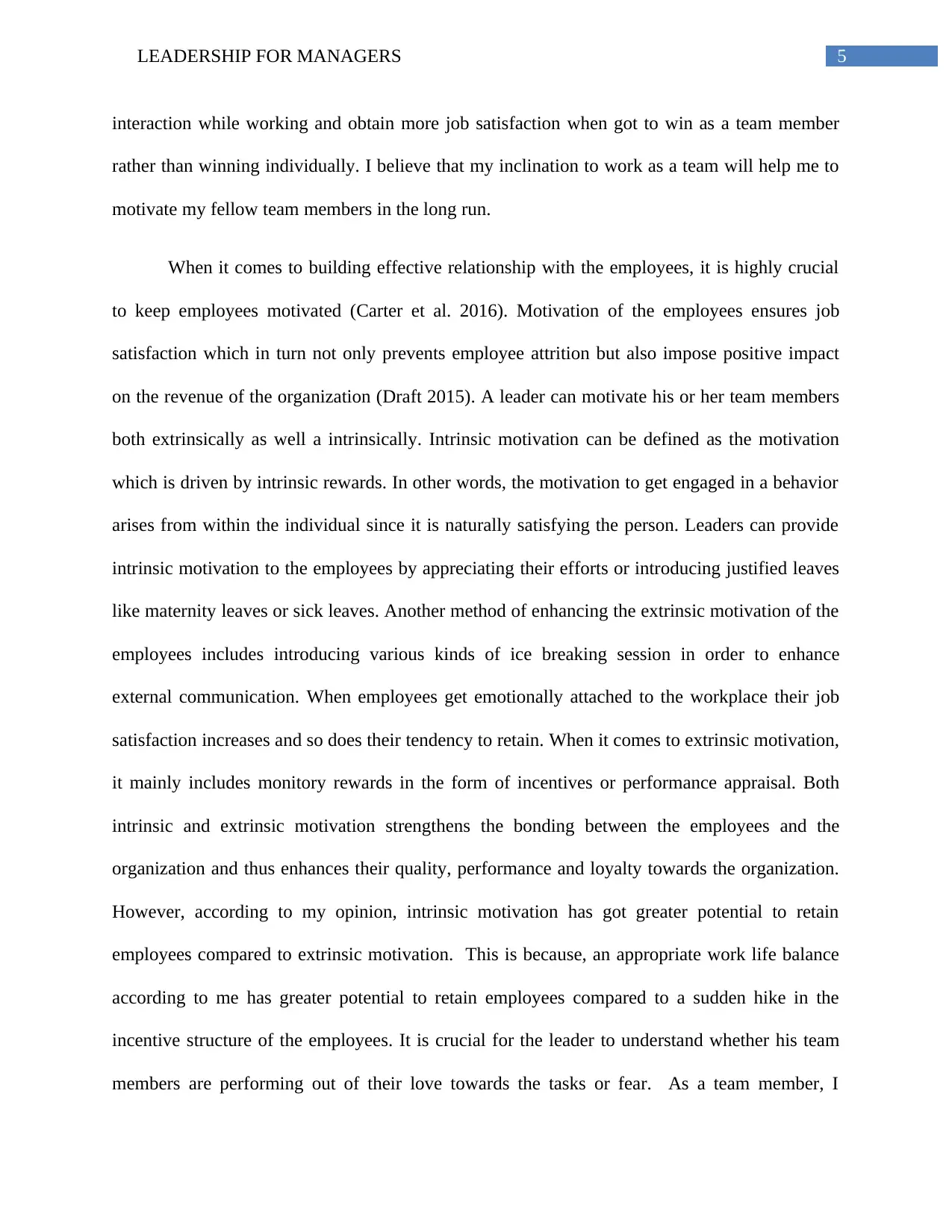
5LEADERSHIP FOR MANAGERS
interaction while working and obtain more job satisfaction when got to win as a team member
rather than winning individually. I believe that my inclination to work as a team will help me to
motivate my fellow team members in the long run.
When it comes to building effective relationship with the employees, it is highly crucial
to keep employees motivated (Carter et al. 2016). Motivation of the employees ensures job
satisfaction which in turn not only prevents employee attrition but also impose positive impact
on the revenue of the organization (Draft 2015). A leader can motivate his or her team members
both extrinsically as well a intrinsically. Intrinsic motivation can be defined as the motivation
which is driven by intrinsic rewards. In other words, the motivation to get engaged in a behavior
arises from within the individual since it is naturally satisfying the person. Leaders can provide
intrinsic motivation to the employees by appreciating their efforts or introducing justified leaves
like maternity leaves or sick leaves. Another method of enhancing the extrinsic motivation of the
employees includes introducing various kinds of ice breaking session in order to enhance
external communication. When employees get emotionally attached to the workplace their job
satisfaction increases and so does their tendency to retain. When it comes to extrinsic motivation,
it mainly includes monitory rewards in the form of incentives or performance appraisal. Both
intrinsic and extrinsic motivation strengthens the bonding between the employees and the
organization and thus enhances their quality, performance and loyalty towards the organization.
However, according to my opinion, intrinsic motivation has got greater potential to retain
employees compared to extrinsic motivation. This is because, an appropriate work life balance
according to me has greater potential to retain employees compared to a sudden hike in the
incentive structure of the employees. It is crucial for the leader to understand whether his team
members are performing out of their love towards the tasks or fear. As a team member, I
interaction while working and obtain more job satisfaction when got to win as a team member
rather than winning individually. I believe that my inclination to work as a team will help me to
motivate my fellow team members in the long run.
When it comes to building effective relationship with the employees, it is highly crucial
to keep employees motivated (Carter et al. 2016). Motivation of the employees ensures job
satisfaction which in turn not only prevents employee attrition but also impose positive impact
on the revenue of the organization (Draft 2015). A leader can motivate his or her team members
both extrinsically as well a intrinsically. Intrinsic motivation can be defined as the motivation
which is driven by intrinsic rewards. In other words, the motivation to get engaged in a behavior
arises from within the individual since it is naturally satisfying the person. Leaders can provide
intrinsic motivation to the employees by appreciating their efforts or introducing justified leaves
like maternity leaves or sick leaves. Another method of enhancing the extrinsic motivation of the
employees includes introducing various kinds of ice breaking session in order to enhance
external communication. When employees get emotionally attached to the workplace their job
satisfaction increases and so does their tendency to retain. When it comes to extrinsic motivation,
it mainly includes monitory rewards in the form of incentives or performance appraisal. Both
intrinsic and extrinsic motivation strengthens the bonding between the employees and the
organization and thus enhances their quality, performance and loyalty towards the organization.
However, according to my opinion, intrinsic motivation has got greater potential to retain
employees compared to extrinsic motivation. This is because, an appropriate work life balance
according to me has greater potential to retain employees compared to a sudden hike in the
incentive structure of the employees. It is crucial for the leader to understand whether his team
members are performing out of their love towards the tasks or fear. As a team member, I
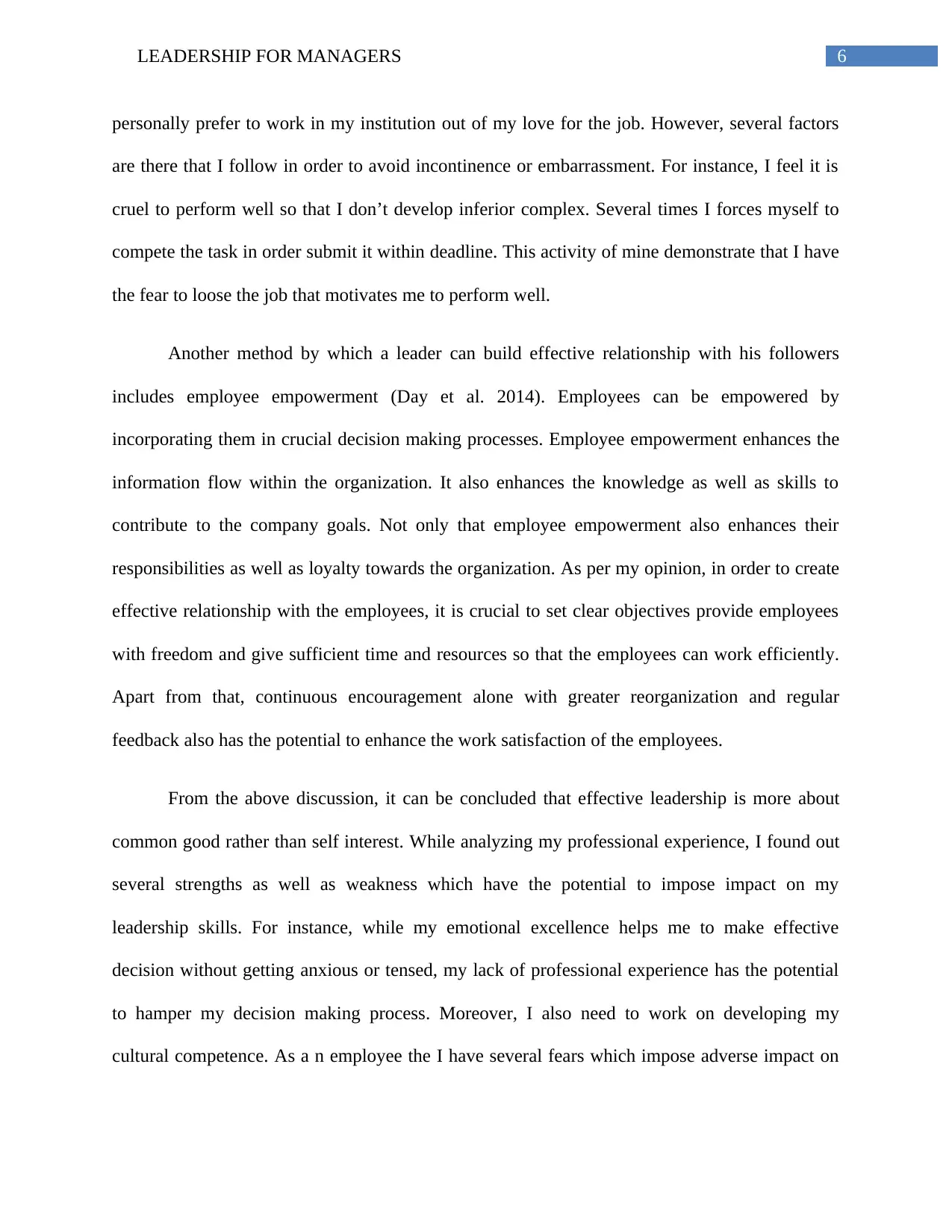
6LEADERSHIP FOR MANAGERS
personally prefer to work in my institution out of my love for the job. However, several factors
are there that I follow in order to avoid incontinence or embarrassment. For instance, I feel it is
cruel to perform well so that I don’t develop inferior complex. Several times I forces myself to
compete the task in order submit it within deadline. This activity of mine demonstrate that I have
the fear to loose the job that motivates me to perform well.
Another method by which a leader can build effective relationship with his followers
includes employee empowerment (Day et al. 2014). Employees can be empowered by
incorporating them in crucial decision making processes. Employee empowerment enhances the
information flow within the organization. It also enhances the knowledge as well as skills to
contribute to the company goals. Not only that employee empowerment also enhances their
responsibilities as well as loyalty towards the organization. As per my opinion, in order to create
effective relationship with the employees, it is crucial to set clear objectives provide employees
with freedom and give sufficient time and resources so that the employees can work efficiently.
Apart from that, continuous encouragement alone with greater reorganization and regular
feedback also has the potential to enhance the work satisfaction of the employees.
From the above discussion, it can be concluded that effective leadership is more about
common good rather than self interest. While analyzing my professional experience, I found out
several strengths as well as weakness which have the potential to impose impact on my
leadership skills. For instance, while my emotional excellence helps me to make effective
decision without getting anxious or tensed, my lack of professional experience has the potential
to hamper my decision making process. Moreover, I also need to work on developing my
cultural competence. As a n employee the I have several fears which impose adverse impact on
personally prefer to work in my institution out of my love for the job. However, several factors
are there that I follow in order to avoid incontinence or embarrassment. For instance, I feel it is
cruel to perform well so that I don’t develop inferior complex. Several times I forces myself to
compete the task in order submit it within deadline. This activity of mine demonstrate that I have
the fear to loose the job that motivates me to perform well.
Another method by which a leader can build effective relationship with his followers
includes employee empowerment (Day et al. 2014). Employees can be empowered by
incorporating them in crucial decision making processes. Employee empowerment enhances the
information flow within the organization. It also enhances the knowledge as well as skills to
contribute to the company goals. Not only that employee empowerment also enhances their
responsibilities as well as loyalty towards the organization. As per my opinion, in order to create
effective relationship with the employees, it is crucial to set clear objectives provide employees
with freedom and give sufficient time and resources so that the employees can work efficiently.
Apart from that, continuous encouragement alone with greater reorganization and regular
feedback also has the potential to enhance the work satisfaction of the employees.
From the above discussion, it can be concluded that effective leadership is more about
common good rather than self interest. While analyzing my professional experience, I found out
several strengths as well as weakness which have the potential to impose impact on my
leadership skills. For instance, while my emotional excellence helps me to make effective
decision without getting anxious or tensed, my lack of professional experience has the potential
to hamper my decision making process. Moreover, I also need to work on developing my
cultural competence. As a n employee the I have several fears which impose adverse impact on
Paraphrase This Document
Need a fresh take? Get an instant paraphrase of this document with our AI Paraphraser
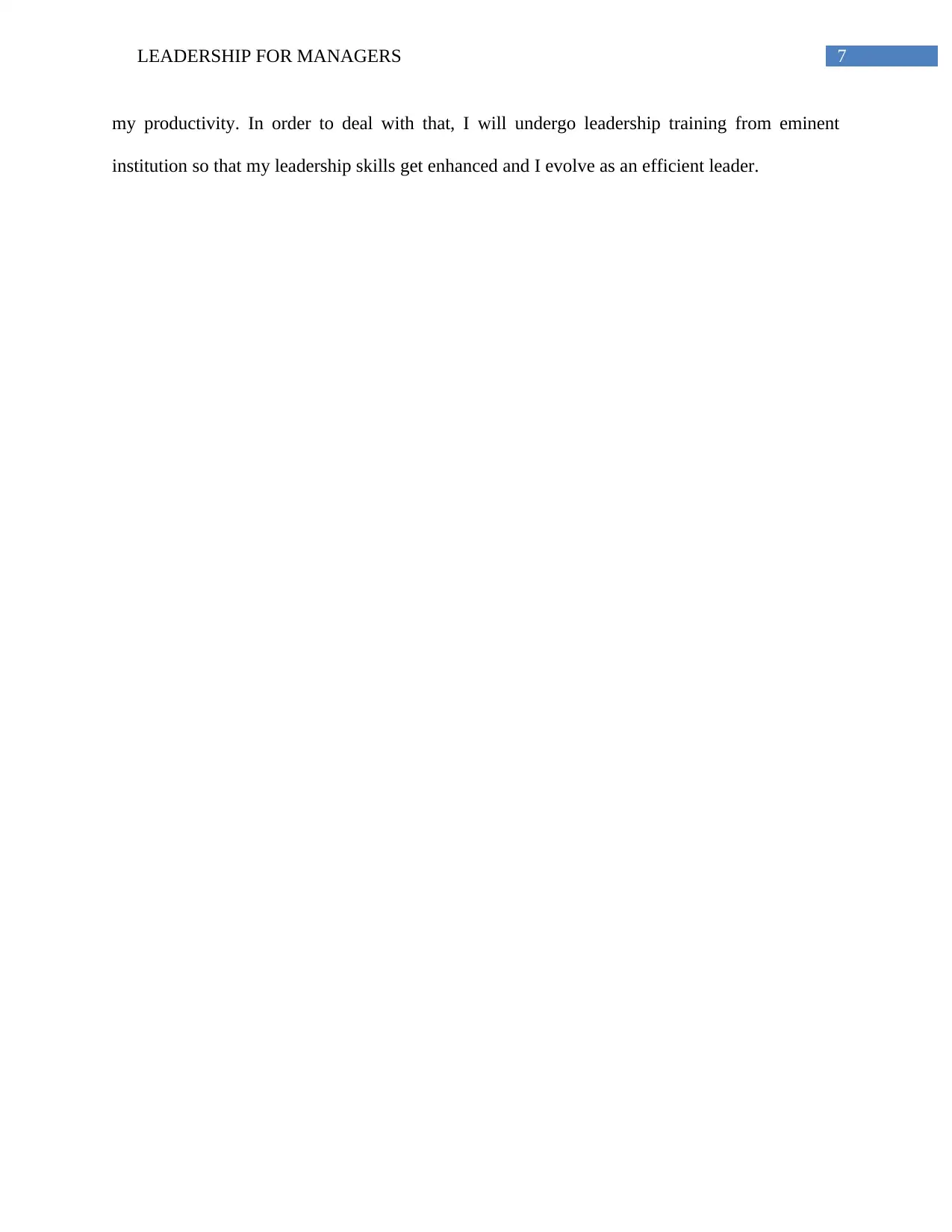
7LEADERSHIP FOR MANAGERS
my productivity. In order to deal with that, I will undergo leadership training from eminent
institution so that my leadership skills get enhanced and I evolve as an efficient leader.
my productivity. In order to deal with that, I will undergo leadership training from eminent
institution so that my leadership skills get enhanced and I evolve as an efficient leader.
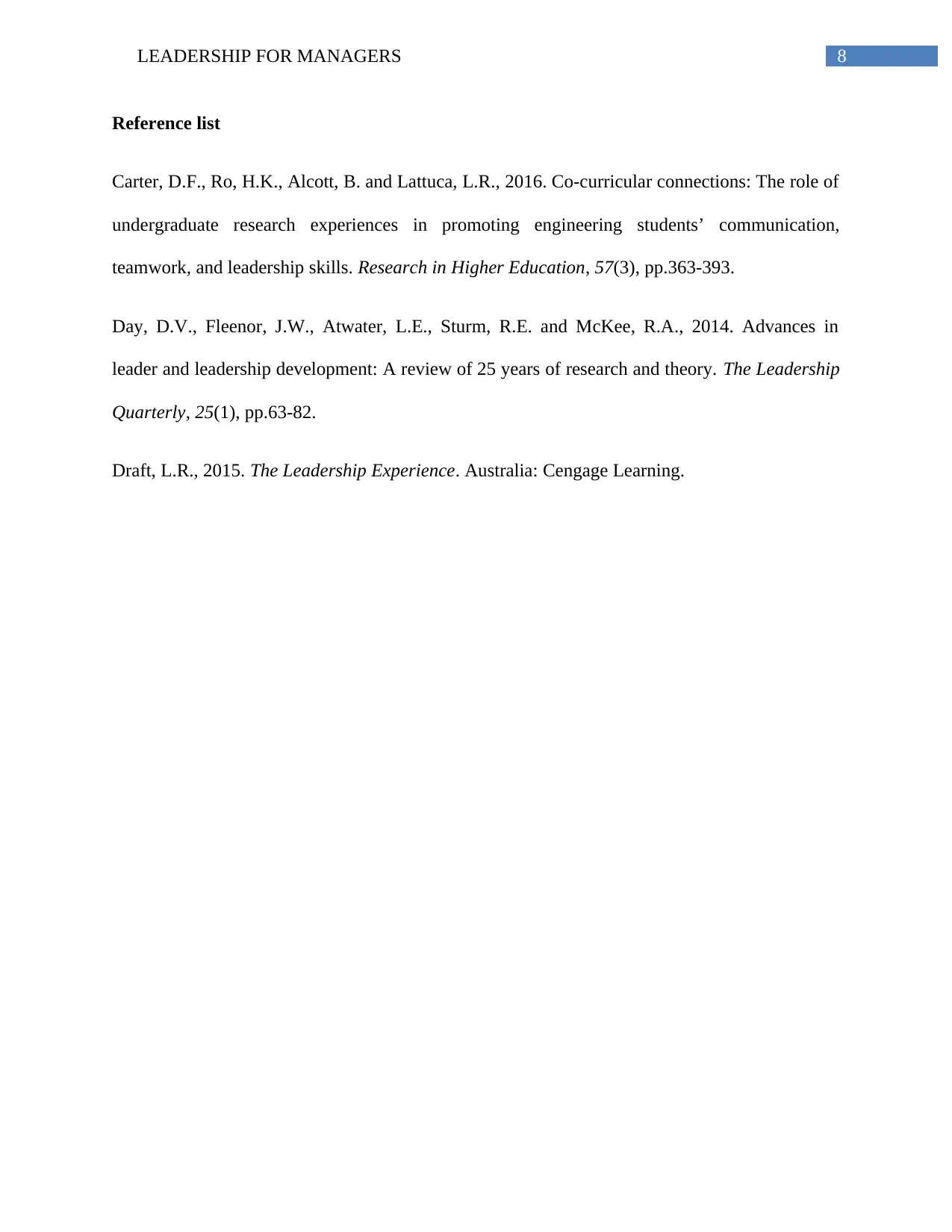
8LEADERSHIP FOR MANAGERS
Reference list
Carter, D.F., Ro, H.K., Alcott, B. and Lattuca, L.R., 2016. Co-curricular connections: The role of
undergraduate research experiences in promoting engineering students’ communication,
teamwork, and leadership skills. Research in Higher Education, 57(3), pp.363-393.
Day, D.V., Fleenor, J.W., Atwater, L.E., Sturm, R.E. and McKee, R.A., 2014. Advances in
leader and leadership development: A review of 25 years of research and theory. The Leadership
Quarterly, 25(1), pp.63-82.
Draft, L.R., 2015. The Leadership Experience. Australia: Cengage Learning.
Reference list
Carter, D.F., Ro, H.K., Alcott, B. and Lattuca, L.R., 2016. Co-curricular connections: The role of
undergraduate research experiences in promoting engineering students’ communication,
teamwork, and leadership skills. Research in Higher Education, 57(3), pp.363-393.
Day, D.V., Fleenor, J.W., Atwater, L.E., Sturm, R.E. and McKee, R.A., 2014. Advances in
leader and leadership development: A review of 25 years of research and theory. The Leadership
Quarterly, 25(1), pp.63-82.
Draft, L.R., 2015. The Leadership Experience. Australia: Cengage Learning.
1 out of 9
Related Documents
Your All-in-One AI-Powered Toolkit for Academic Success.
+13062052269
info@desklib.com
Available 24*7 on WhatsApp / Email
![[object Object]](/_next/static/media/star-bottom.7253800d.svg)
Unlock your academic potential
© 2024 | Zucol Services PVT LTD | All rights reserved.





